Did we have to pay such a heavy price for this verdict?
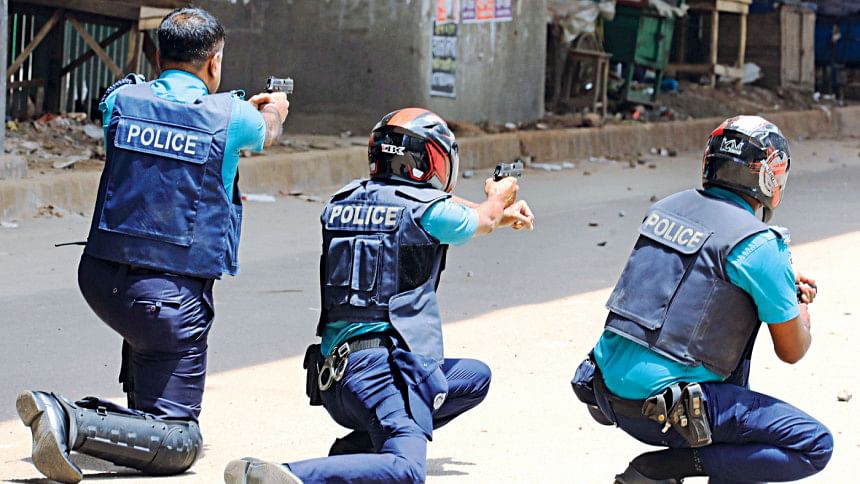
The verdict is in. The Appellate Division through its observations has recommended that quotas be restricted to seven percent: five percent for freedom fighters' children, one percent for ethnic minorities, and one percent for people with disabilities.
For all practical purposes, it is a win for the protesters. Or so it would have been, had the morgues not been brimming with dead bodies, hospitals inundated with those critically injured, and public establishments set on fire around the country. Everyone is anxious, afraid, angry, and agitated—a state of despair exacerbated manifold by the internet blackout imposed by the government to control the free flow of information. How many will be picked up, how many tortured, how many killed, how many maimed for life before all this is over?
Each new day has brought with it ever-more shocking revelations of the cruelty of state apparatuses. The events of Tuesday (when BCL cadres viciously attacked protesters) and Wednesday (when law enforcement agencies stormed the public universities to drive off students from the campuses) already seem like distant memories. And talk as we must about the brutality in the days since, it's worth revisiting why law enforcers would have the right or the audacity to march into campuses of autonomous institutions, firing shotguns and sound grenades aimed at students in their late teens and early 20s. What does it say about our university authorities, VCs and provosts, except what we have known all along—that they are mere puppets to the whims of the ruling party? What mockery they have all made of the sanctity of the university campus(es), whose walls are witness to some of the biggest uprisings against injustice in our history! If the students are now asking for the resignation of the VCs and provosts, it is the least they can demand for being betrayed time and time again.
Then came Thursday, which brought with it state-sponsored violence, the scale of which none of us were prepared for, despite living through the brutal squashing of the road safety movement in 2018 and every dissenting movement since. Areas in Dhaka turned into zones of unimaginable violence, with law enforcers charging upon and firing on students armed at most with sticks and brickbats, without provocation in most cases. The clips shared by countless students on social media, followed by eye-witness reports in the media, provide chilling accounts of the atrocities conducted by the police and BGB in the name of maintaining law and order. What law and whose order can justify the use of lethal weapons to disperse protesters, some not even old enough to vote? At least 25 people were killed, 11 of them students, including a 17-year-old, and over 3,000 were injured—that we know of. Predictably, the government's heavy-handedness only served to amplify the anger of the masses, and we began to see protesters—or motivated elements infiltrating the movement—turn to increasingly destructive measures to resist.
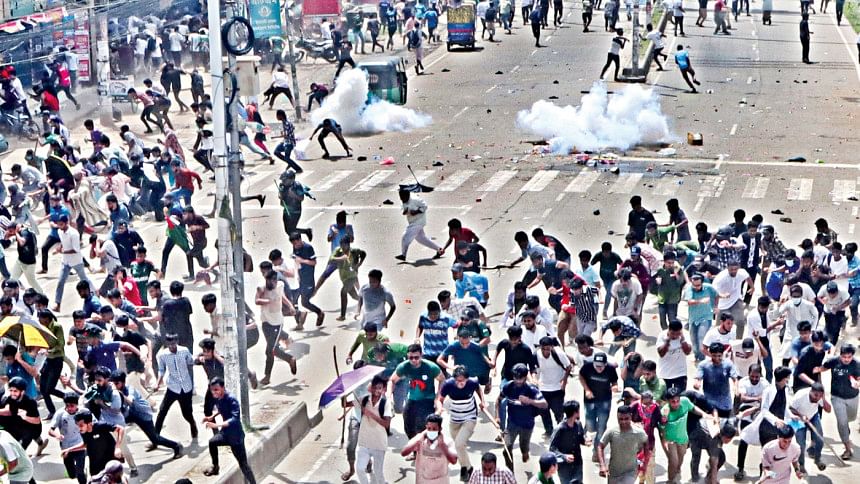
What did the government really think—that they could shoot the young students into submission after their trusted helmet bahini had failed to get the job done? That they could dangle the carrot of dialogue and concession, all the while opening fire upon the students, including those from private universities who had taken to the streets simply to express solidarity with their public university counterparts? The movement might have started on the issue of the reform of quota system, but underneath simmered discontent accumulated over the years about the culture of repression, conduct of law enforcement and actions of the ruling party's student wing. The outpouring on the streets over the past week is the manifestation of a long and deeply felt sense of injustice that has only been fanned by virulent rhetoric and violent tactics of the powers that be. By resorting to its tried-and-tested strategy, the government once again proved that it is too arrogant to listen to citizens' legitimate and peaceful demands for policy reforms. And in the process, it has done itself the biggest disservice.
Now, the country is in the throes of chaos. From toll booths to offices of Bangladesh Road and Transport Authority (BTRA) offices, from flyovers to metro rail stations, numerous public establishments have been set ablaze or vandalised over the past few days. As per a report in this daily, miscreants wreaked havoc inside the Mirpur 10 and Kazipara metro rail stations, smashing vending machines, ticket counters, close circuit cameras and everything else on sight. We condemn such mindless destruction in no uncertain terms. And while the government can blame third party political elements all it wants now for the anarchy that we have witnessed over the past few days, it cannot evade responsibility for creating the conditions under which such chaos could breed and spread.
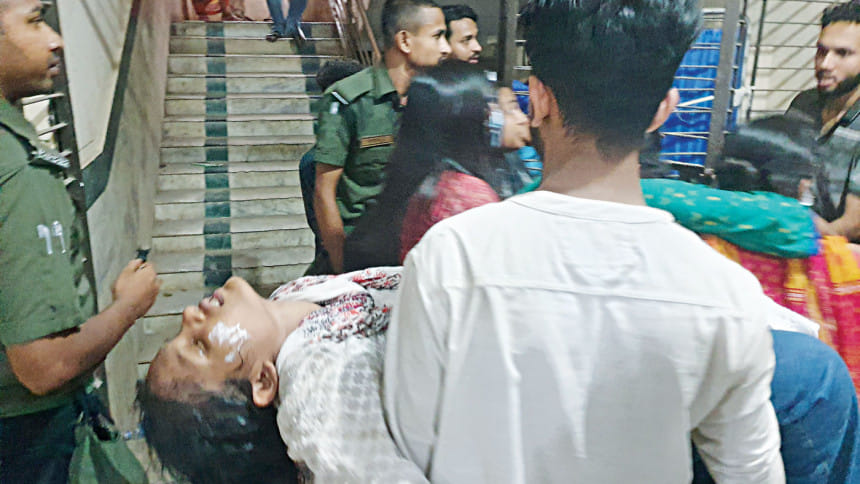
If it could declare redistribution of quotas on Thursday night, and the hearing of the Appellate Division could be fast-tracked to Sunday, why could it not do so the week before? Why did it insist that its hands were tied, when the court itself had clarified that should the government want, it could simply issue a new circular? Why did government high-ups vilify the protesters and resort to their age-old strategy of "othering" to justify unlawful attacks by the student wing? Why did it unleash the BCL on protesting students, and then, when the protesters fought back and drove them out of the campuses, close down all educational institutions and halls? And most infuriatingly, why did it pour fuel in the fire by shooting young students and civilians? Why did it fail so miserably at containing the situation without resorting to lethal means? Why did it serve chaos on a platter for the so-called durbrittokaris to take advantage of?
The death toll has continued to rise, with at least 66 killed on Friday alone—that we could confirm—and at least 21 on Saturday, even amid a curfew. In only four days, the death toll has crossed 127, as per data collected directly from the hospitals as of Saturday (the real count could be much higher), and includes law enforcers, journalists, pedestrians, rickshaw pullers and even children. It is truly inconceivable that so many lives have needlessly been lost, simply because the government was too obstinate to "give in" to the students' demands. And that political elements are now trying to create anarchy using the momentum of the movement will only endanger further the lives of ordinary students who are fighting for their dignity. The last thing we want is for the students to become pawns in a wider battle for power.
Even if the protests are ultimately called off, what lies ahead for those who engaged in the protests, particularly those who were in leadership positions? Nahid Islam, a key organiser of the anti-discrimination student movement, was picked up by "plainclothes persons" in the early morning yesterday, allegedly because he refused to agree with the government's proposal for a dialogue ahead of the Supreme Court's hearing. Nahid has since been found by his family and taken to the hospital to tend to injuries allegedly inflicted during the hours he was "missing." After the quota reform and road safety movements of 2018, we saw how students were tracked down, detained, arrested, surveilled upon and threatened, and their lives irrevocably altered, with the state showing no mercy for those who had dared challenge it.
The verdict may be in, but the bloodshed cannot be so easily erased from public memory. At the very least, the government should declare a general amnesty for student protesters as a gesture of goodwill. It should restore internet connection, which will bring some semblance of normalcy back to the country and help assuage people's anxieties and dispel the rumours going around. If the government is capable of learning any lesson at all, it should be that it can no longer afford to be so arrogant, so impervious to people's simmering frustrations and so ruthless in their handling of mass movements. After all, there is nothing more dangerous than a people who have nothing left to lose.
Sushmita S Preetha is the op-ed editor at The Daily Star.
Follow The Daily Star Opinion on Facebook for the latest opinions, commentaries and analyses by experts and professionals. To contribute your article or letter to The Daily Star Opinion, see our guidelines for submission.

 For all latest news, follow The Daily Star's Google News channel.
For all latest news, follow The Daily Star's Google News channel. 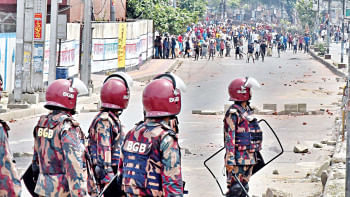
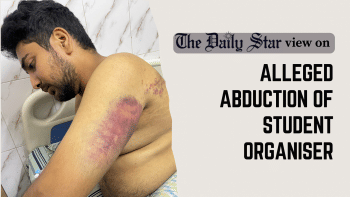




Comments